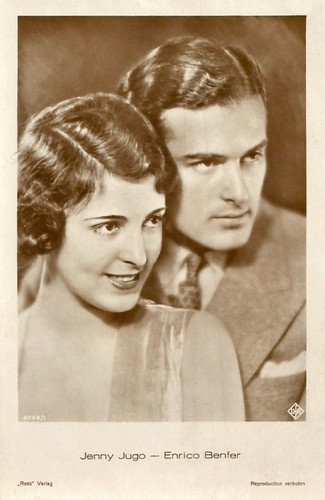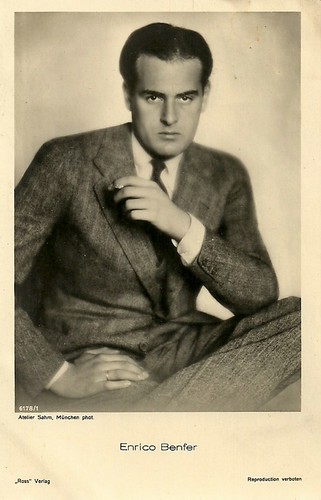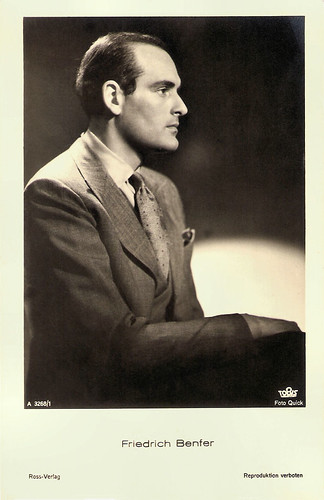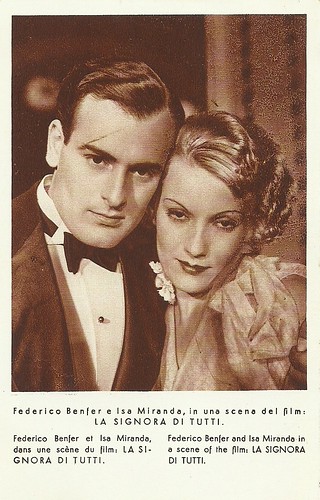
German postcard by Ross Verlag, no. 4535/1, 1929-1930. Photo: Ufa.

German postcard by Ross Verlag, no. 4748/1, 1929-1930. Photo: Ufa.

German postcard by Ross Verlag, no. 4748/2, 1929-1930. Photo: Ufa.
Handsome Italian
Enrico or Friedrich Benfer was born as Federico Benfer in Naples, Italy in 1905. He moved early to Berlin where he received a business education.
Only 20, he made his film debut in Ich war zu Heidelberg Student/I was a Student at Heidelberg (Wolfgang Neff, 1927) with Mary Peach.
Next, he played a supporting part as a racing cyclist in Die Carmen von St. Pauli/The Carmen of St. Pauli (Erich Waschneck, 1928). The star of the film was Jenny Jugo, who fell in love with the handsome Italian and would finally become his wife in 1950.
So soon after his debut, he played leading roles opposite Jugo under the name of Enrico Benfer. To his first films belong the Ufa productions Die Schmugglerbraut von Mallorca/The Smugglers' Bride of Mallorca (Hans Behrendt, 1929) and Die Flucht vor der Liebe/The Flight from Love (Hans Behrendt, 1929).
In the 1930s, he played his most important roles in a series of films alongside his wife. Together, they starred in such films as Herz ist Trumpf/Heart is King (Carl Boese, 1934) with Paul Hörbiger, Pechmarie/Hard Luck Mary (Erich Engel, 1935), Mädchenjahre einer Königin/Girlhood of a Queen (Erich Engel, 1936) about Queen Victoria, and Die Nacht mit dem Kaiser/The Night with the Emperor (Erich Engel, 1936) about Napoleon.

German postcard by Ross Verlag, no. 3916/1, 1928-1929. Photo: Ufa.

German postcard by Ross Verlag, no. 4298/1, 1929-1930. Photo: Ufa.

German postcard by Ross Verlag, no. 4749/1, 1929-1930. Photo: Ufa.
Ultimately hollow entities
Enrico Benfer worked also in international productions. In France, he was seen opposite Marie Glory in Mon béguin/My crush (Hans Behrendt, 1931). In Hungary, he starred opposite Franciska Gaál in the Universal production Kleine Mutti/Little Mommy (Hermann Kosterlitz aka Henry Koster, 1935).
And in Italy, he appeared with Isa Miranda in La Signora Di Tutti/Everybody's Woman (Max Ophüls, 1934). Hal Erickson at AllMovie: “Max Ophuls' La Signora di Tutti can be regarded today as a dress rehearsal for his 1955 masterpiece Lola Montes, though it comes nowhere near the brilliance of that later classic.
Isa Miranda stars as a famous actress who, in the opening scenes, attempts suicide. A series of lavish flashbacks details the events leading up to her cataclysmic decision. In her heyday, the actress' haunting beauty was enough to drive men mad--and some to the point of killing themselves. Modern audiences may have trouble keeping a straight face during some of the more heated passages, but Ophuls’ basic premise--that fame and celebrity are ultimately hollow entities--is not to be taken lightly.
The director's fabled camera techniques help smooth over some of the rougher and more ludicrous passages. La Signora di Tutti represents Max Ophuls' sole participation in the fascist-dominated Italian film industry of the 1930s.”
And back in Germany after his foreign activities, Benfer co-starred with the Spanish actress Imperio Argentina in Andalusische Nächte/Nights in Andalusia (Herbert Maisch, 1938).

German postcard by Ross Verlag, no. 4444/1, 1929-1930. Photo: Ufa.

German postcard. by Ross Verlag, no. 6178/1, 1931-1932. Photo: Atelier Sahm, München.

German postcard by Ross Verlag, no. A 3268/1, 1941-1944. Photo: Quick / Tobis.
Grocery Buyer
At the end of the 1930s, Enrico Benfer’s film career in Germany halted, and stage offers also became rare. His last German film was Das Herz der Königin/The Heart of a Queen (Carl Froelich, 1940) starring Zarah Leander.
When the Second World War broke out he went back to Italy where he took part in five Italian productions. Under the name Federico Benfer, he played in Mamma/Mother (Guido Brignone, 1940) starring opera tenor Beniamino Gigli, and Lucrezia Borgia/Lucretia Borgia (Hans Hinrich, 1940) featuring Isa Pola.
Then followed Turbine (Camillo Mastrocinque, 1941), Confessione/Confession (Flavio Calzavara, 1941) with Paola Barbara, and Oro nero/Black Gold (Enrico Guazzoni, 1942) starring Juan de Landa.
After these films, Benfer ended his career as an actor. He worked as a grocery buyer in the Air Ministry and was on 24 October 1944 drafted into the army. After the war, he married Jenny Jugo in 1950.
Since then he lived with his paraplegic wife on a farm in Bad Heilbrunn in Upper Bavaria. Until his death, he led his company, Benfer Chimica, in the Italian city of Bazzano. Friedrich Benfer died in 1996 in Milano, Italy at the age of 90.

Italian postcard. by Rizzoli, Milano, 1934-XII. Photo: Novella-Film. Publicity still for La signora di tutti/Everybody's Woman (Max Ophüls, 1934) with Enrico Benfer and Isa Miranda.

German postcard by Das Illustrierte Blatt, Frankfurter Illustrierte. Photo: Ufa. Publicity still for the German film Das Herz der Königin (Carl Froehlich 1940), starring Zarah Leander (in the middle), on the right is Friedrich/Enrico Benfer (David Riccio), on the left Will Quadflieg (Page Olivier).

Italian postcard by ASER (A. Scarmiglia Ed. Roma), no. 158. Photo: Scalera.

Italian postcard by A.S. "Ars". E.& G. R., no. 2137.
Sources: Hal Erickson (AllMovie), Thomas Staedeli (Cyranos), Filmportal.de, Wikipedia (German) and IMDb.
This post was last updated on 10 May 2023.
No comments:
Post a Comment